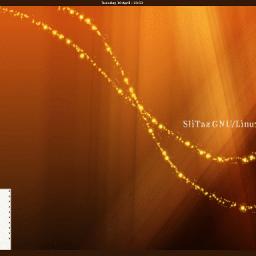Friday Distro: SliTaz Linux
 My current fetish, if you can call it that, is lightweight distros. Once you decide you don't need a heavyweight desktop like Gnome or KDE, down the slope you go, asking, "How light a system can I really get?" Depending on how much you're willing to compromise, the answer is, "pretty far!" And well at the far end of lightweight is SliTaz Linux. It's a marvel of engineering. What you get is a full graphical desktop, web server, Firefox, and database tools, all configured to run in less than 256MB of memory with no need to even hit the hard drive when running! The whole distro fits easily on 30MB on a (small!) USB stick.
My current fetish, if you can call it that, is lightweight distros. Once you decide you don't need a heavyweight desktop like Gnome or KDE, down the slope you go, asking, "How light a system can I really get?" Depending on how much you're willing to compromise, the answer is, "pretty far!" And well at the far end of lightweight is SliTaz Linux. It's a marvel of engineering. What you get is a full graphical desktop, web server, Firefox, and database tools, all configured to run in less than 256MB of memory with no need to even hit the hard drive when running! The whole distro fits easily on 30MB on a (small!) USB stick.The compromises aren't that drastic, but you need to know them. But one is that the distro is built on busybox, which is a reduced set of basic *nix utilities. You get the JWM window manager, the lighttpd webserver, SQLite, Firefox and Midori. You don't get stuff like LibreOffice or much selection of graphical software. There's a packaging system, but it uses a custom format (TazPKG) with repositories that are a bit lean. But the idea isn't to be your new desktop. Put SliTaz on a USB stick and you can quickly get to a command prompt to shell into your servers, FTP some files around, set up quick HTTP access to some files somewhere, listen to some music (it's got ALSAplayer), or browse the web. And you can do so without much script fu: when the system boots you're sitting at a JWM desktop (or openbox, if you want). And not only does it boot quickly, but your machine is super-fast when running since the entire system can run in memory &emdash; and not much memory, at that!
Increasingly, this kind of system has huge appeal to me. All my stuff is on network storage, and my mail and calendar are on hosted internet services. I don't need much in a desktop box a lot of the time. Naturally, it runs on a Raspberry Pi. Want to check it out? Read another review at Dark Duck or check out the DistroWatch page. There are some screenshots at LinuxScreenshots.org.
B. Everyone (by which I mean, power nerds) loves running linux on all kinds of stuff, so what's wrong with running linux on old or embedded systems? Seriously, if you have nothing to contribute besides insults then don't even comment. You're selling keystrokes for hatred, and that's a crappy waste of everyone's time.
C. No, most distros don't run on a 486 anymore, at least not without a hell of a lot of customization. Many are compiled with optimizations so they don't run natively on anything below a PII or so. Also, most require a lot of work arounds to run on anything under 256 or 192 MB of RAM, so "runs on a 486" vs "runs on a 486 with an amount of memory that a 486 would have" becomes a concern.